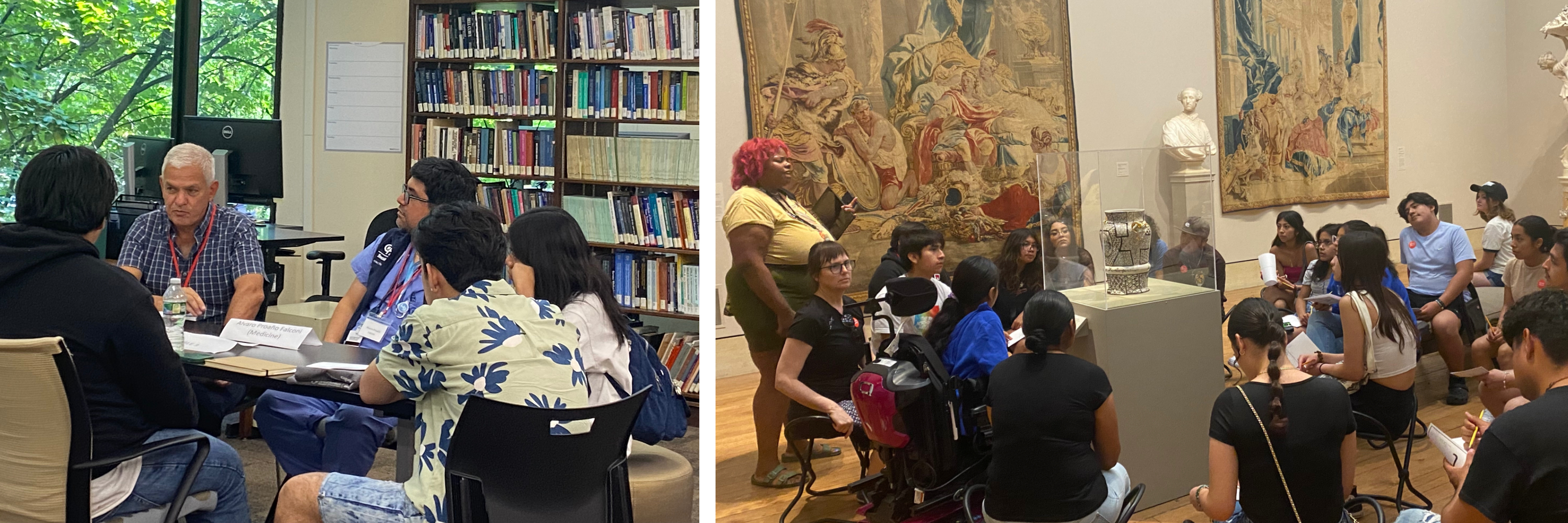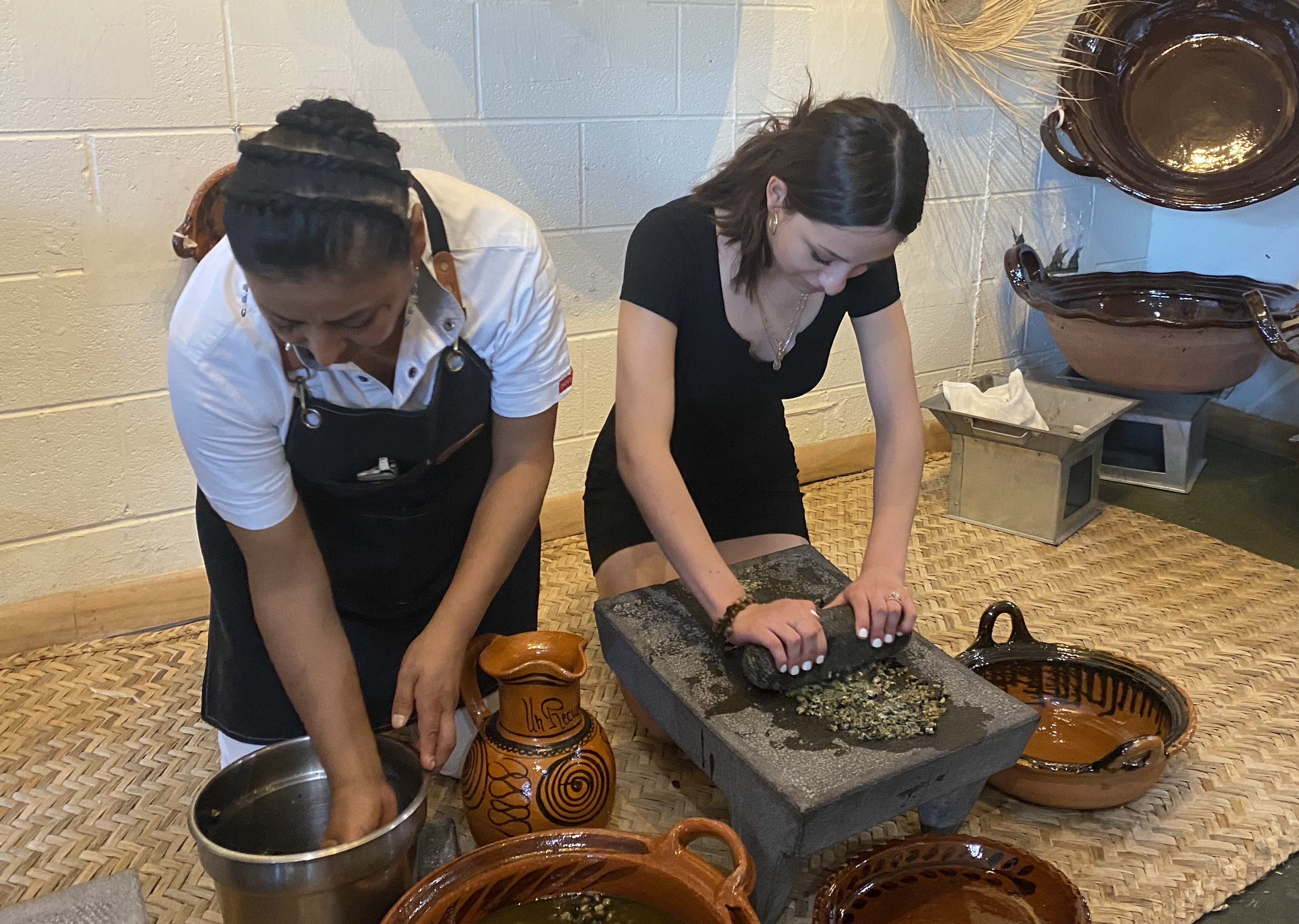
When 15 high school students arrived on Penn’s campus this past summer for the High School Summer Latinx Leadership Institute, many had never stayed overnight on a college campus. As part of the post-secondary success and college-readiness program, they would not only spend three days at Penn, but also tour other local universities to learn how to navigate the college-going process.
The initiative—a partnership between Penn’s Center for Latin American and Latinx Studies (CLALS) and the nonprofit Centro de Cultura Arte Trabajo y Educación (CCATE)—helps Latinx students from Norristown, approximately 20 miles from Penn’s campus, through exposure to higher education options, faculty, and staff; financial support; and leadership opportunities. Though the collaboration between CLALS and CCATE is longstanding, the Institute is only in its second year, with this past summer marking the first time that participants came to campus.

A class called Latinos in the U.S. taught by Emilio Parrado, Dorothy Swaine Thomas Professor of Sociology and CLALS co-founding director, inspired the program. Through the course, offered as an Academically Based Community Service (ABCS) course through the Netter Center for Community Partnerships, undergraduates go to CCATE and work with high school students as peer mentors with insight into the college experience. Parrado explains that the idea is to break down the barriers to college access that can occur in Latinx and immigrant communities, in particular in a place like Norristown, where parents may not speak English, are potentially less familiar with the U.S. education system, or both.
“We wanted to expand upon that ABCS component with a summer program that was free, didn’t require an application, and that discussed college access more broadly for the Latinx immigrant community,” he says. “This is not just about knowledge of higher education at Penn, but also about exposure to a wide range of options and higher education mobility for the community writ large.”
Seeing Yourself in Higher Ed
Before arriving on the Penn campus for the first time, Institute students spent two days at CCATE participating in community-building activities and workshops on mental health, career development, and the college application process. Parrado, CLALS co-founding director and Class of 1965 Endowed Term Professor of Political Science Tulia Falleti, and CLALS Associate Director Catherine Bartch, felt that bringing the high schoolers to the Penn campus physically was an important next step in the program’s evolution.
So the students spent three days and two nights on campus familiarizing themselves with the grounds, speaking to faculty and staff to get a sense of the college environment and experience, meeting with admissions officers, visiting La Casa Latina—the student-focused hub that’s been part of Penn for more than 20 years—and connecting other Latinx students currently matriculated at Penn. Bartch says a highlight of the Institute was a Penn faculty and staff meet-and-greet where students rotated to tables in 15-minute intervals to learn and ask questions about various fields, including philosophy, Hispanic studies, nursing, engineering, sociology, medicine, law, politics, international studies, and business.
This is not just about knowledge of higher education at Penn, but also about exposure to a wide range of options and higher education mobility for the community writ large.
Beyond Penn, the students toured Temple University and Drexel University. They also visited the Philadelphia Museum of Art, the 2023 Chinese Lantern Festival, and local neighborhoods in downtown Philadelphia, including South Philadelphia, where they had dinner at Casa Mexico with renowned Mexican chef and immigration activist Cristina Martinez, who spoke poignantly about her own experience as an immigrant; Bartch says this inspired some of the high schoolers to share their own stories.
The students also built deep bonds with Penn undergraduates like Natalia Ramos Bellido, C’26, who assisted with the Institute and volunteers regularly at the CCATE offices leading ACT prep, resume building, and mentoring sessions.
“The feedback I got from students was that it was really powerful for them to see themselves in the stories of the faculty, staff, students, and community members they met during the program,” says Ramos Bellido, who immigrated to the U.S. from Mexico during high school. She adds that she appreciated Penn inviting other institutions to speak to the students because the “scope of options for the Latinx community are diverse and many, and it’s important for the community to be aware of them.”
Supporting Families and the Latinx Community
Awareness of post-secondary options must extend beyond the students, according to Parrado and Bartch, particularly when college-going is often a family decision or cultural norms dictate that students work after compulsory schooling.
For that reason, “on the last day, we did a session just for the parents and we did that completely in Spanish,” Bartch says. “We fielded a lot of questions about the college application process.”
Parrado and the Penn undergraduates in his class, with the support of his former teaching assistant, Melissa Ortiz, GED’21, are surveying recent CCATE graduates and Institute participants to finetune the program and provide stronger supports for not just college going but college retention. “The data show that college access is a barrier,” Parrado says, “but it’s also about barriers to college completion. We want to arm young people and their families with all the resources and ongoing supports to not just go to college, but to complete college.”
Ortiz says the anonymous feedback from the student participants has been overwhelmingly positive, with the students requesting more opportunities to visit other types of schools like community colleges and trade schools and sharing excitement about having more opportunities to connect—with one another and with Penn students and faculty.
The hope is to continue the High School Summer Latinx Leadership Institute for many years to come, according to the program’s leadership. It’s currently funded through a two-year grant called Making a Difference in Diverse Communities through the Penn Arts & Sciences, but there are efforts to grow that support through additional grants and University support.
For Parrado, those efforts are necessary. “We don’t expect everyone to go to college, but if our Latinx young people don’t go to college, we don’t want that to be because there was a gap in knowledge about the process,” he says. “We want to show the community that if they want to pursue higher education, it’s absolutely doable.”



